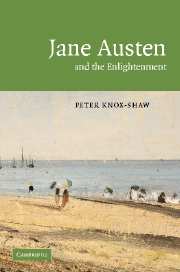Book contents
- Frontmatter
- Contents
- Acknowledgements
- Note on chronology
- PART ONE THE EIGHTEENTH-CENTURY LEGACY
- 1 Auspices
- 2 Pride and Prejudice, a politics of the picturesque
- 3 Northanger Abbey and the liberal historians
- 4 Sense and Sensibility and the philosophers
- PART TWO ENGAGING WITH THE NEW AGE
- Select bibliography
- Index
3 - Northanger Abbey and the liberal historians
Published online by Cambridge University Press: 22 September 2009
- Frontmatter
- Contents
- Acknowledgements
- Note on chronology
- PART ONE THE EIGHTEENTH-CENTURY LEGACY
- 1 Auspices
- 2 Pride and Prejudice, a politics of the picturesque
- 3 Northanger Abbey and the liberal historians
- 4 Sense and Sensibility and the philosophers
- PART TWO ENGAGING WITH THE NEW AGE
- Select bibliography
- Index
Summary
Few controversies can have struck more resonant chords than the feud begun in 1766 by Samuel Sharp with his jaundiced travel-book, Letters from Italy. In 1805 Coleridge noted that travellers came in two kinds, ‘both bad’, but found in favour of the Sharpians. In 1807 Jane Austen reminded Cassandra of an old quarrel on this score, admitting to some change in her view:
We are reading Barretti's other book, & find him dreadfully abusive of poor Mr Sharpe. I can no longer take his part against you, as I did nine years ago.
That it was nine years back that ‘Susan’ took shape may have helped her date the argument with her sister, for Baretti's Journey from London to Genoa (1770), the better tempered of his replies to Sharp, intersects with the novel finally published as Northanger Abbey.
Baretti addresses the account of his native Italy to the English, and sums up his theme in the slogan, ‘it is in your country as in all others’. His aim is to oust the fashion for disparaging travels set by Sharp and Smollett, recently lampooned by Sterne in the figure of Smelfungus. With Shandean guile, he preludes his continental trip with a tale of ‘petty tyranny’ that exposes a horrendous underside to ‘the rural beauties of Devonshire’. A land-agent maliciously ruins the business of an innkeeper after being rejected by his daughter, and his case cuts clean to the nub of contention:
Now, ye Englishmen, said I to myself, behold! Here as well as elsewhere, the whale swallows up the small fishes, whatever you may say of your laws, which you think so antidotal against all sorts of tyranny. Your laws you say, are an adamantine shield that covers your whole island. No oppression is here of any kind; no: not the least shadow of it. But go to mine hostess gentlemen, and you will hear another story. You will hear that it is in your country as in all others; I mean that no such laws can be thought on by mortal legislators, as perfectly to screen the weak against the strong, or the poor against the rich; especially when the subject of complaint is not so great as to draw the public attention, which is generally the case in those many oppressions that the little endure from the great.
- Type
- Chapter
- Information
- Jane Austen and the Enlightenment , pp. 108 - 128Publisher: Cambridge University PressPrint publication year: 2004



